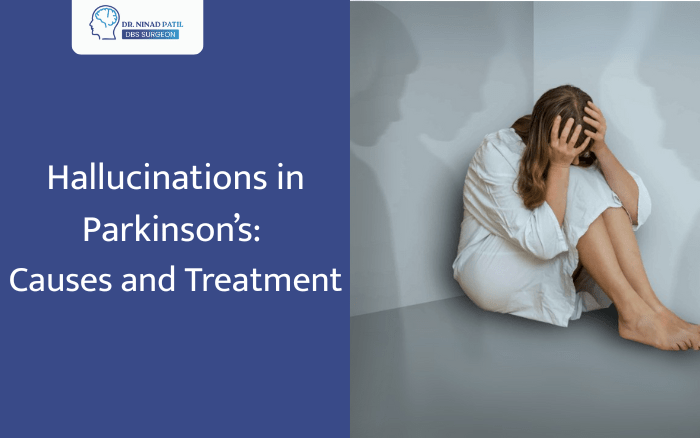Living with Parkinson’s is already a daily challenge, and when hallucinations begin, it can feel overwhelming for both patients and families. Hallucinations in Parkinson’s disease are more common than most people realize, yet they often go unnoticed or misunderstood. Some see shapes, shadows, or even people who aren’t really there. Others may hear voices or feel sensations that don’t exist.
If you’ve been wondering why this happens and what can be done about it, you’re in the right place. Let’s break down what causes hallucinations in Parkinson’s and how they can be treated.
What Are Hallucinations in Parkinson’s?
Hallucinations are experiences where someone sees, hears, or senses things that aren’t actually there. In Parkinson’s, hallucinations often appear in the later stages of the disease, but they can happen earlier too—especially if certain medications are used.
The most common are visual hallucinations—for example, seeing people, animals, or objects that don’t exist. Some people may also have auditory hallucinations (hearing sounds or voices) or tactile hallucinations (feeling like something is touching them).
Unlike simple daydreams, hallucinations feel very real and can be distressing for both the person experiencing them and their caregivers.
What Causes Hallucinations in Parkinson’s?
- Role of Parkinson’s Disease Itself
Parkinson’s affects brain chemicals that regulate movement, thinking, and perception. As the disease progresses, these chemical changes can distort how the brain processes reality, leading to hallucinations.
- Medications and Side Effects
Drugs used to manage Parkinson’s symptoms—like levodopa or dopamine agonists—help with movement but can sometimes overstimulate certain parts of the brain. This can trigger hallucinations, especially when doses are high or taken over many years.
- Cognitive Decline and Dementia
Some people with Parkinson’s develop memory problems or Parkinson’s-related dementia. When this happens, hallucinations often become more frequent and intense.
Other Contributing Factors
- Poor sleep or vivid dreams blending into waking hours
- Infections, such as urinary tract infections, which can temporarily worsen hallucinations
- Dehydration or electrolyte imbalance
- Stress or unfamiliar environments
How to Treat Hallucinations in Parkinson’s
- Medical Management
The first step is often reviewing Parkinson’s medications. Doctors may adjust doses, switch drugs, or add medications designed to ease hallucinations. Some antipsychotic medications, like pimavanserin, clozapine, or quetiapine, are sometimes prescribed because they are safer for people with Parkinson’s compared to other options.
- Non-Medical Approaches
Not every solution comes from a pill. Small lifestyle changes can help reduce the severity of hallucinations:
- Keeping the home well-lit to avoid confusing shadows
- Maintaining good sleep habits
- Regular vision and hearing checkups to rule out other causes
- Reducing stress with calm routines
Role of Caregivers
Caregivers play a vital role. Staying calm during a hallucination is important. Arguing rarely helps. Instead, gently reassuring the person and making the environment feel safe is more effective. Caregivers should also track when hallucinations happen and share this with the doctor, as it helps guide treatment.
When to Seek Medical Help
Mild hallucinations may not always need treatment, but it’s time to consult a doctor if:
- The hallucinations are frequent or frightening
- They affect safety for example, trying to walk toward something that isn’t there
- The person becomes distressed or aggressive
- Hallucinations start suddenly or worsen quickly
Getting timely medical advice prevents complications and improves quality of life for both patients and families.
FAQs
Q1: Are hallucinations common in Parkinson’s disease?
Yes. Around 30–50% of people with Parkinson’s will experience hallucinations at some point.
Q2: Do hallucinations mean Parkinson’s is getting worse?
Not always. Sometimes they are caused by medication side effects, but in later stages of the disease they do become more common.
Q3: Can hallucinations go away if medications are changed?
Yes, in many cases adjusting medications reduces or even stops hallucinations.
Get the Right Treatment for Parkinson’s Hallucinations Today
Hallucinations in Parkinson’s can be unsettling, but they are treatable. Understanding why they happen is the first step toward finding relief. If you or a loved one is facing these challenges, don’t wait for symptoms to escalate.
You can consult Dr. Ninad Patil, who focuses on Parkinson’s disease treatment in Pune at Alpha Superspeciality Clinics. He can guide you with the right treatment plan and support to manage hallucinations effectively.


